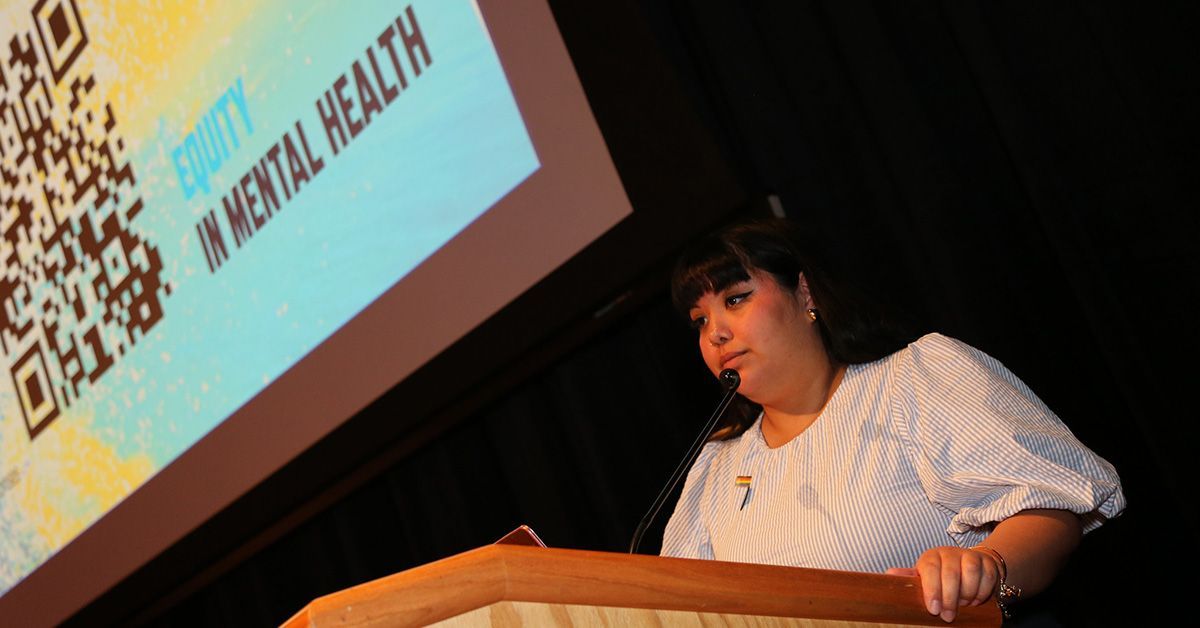Shifting Perspectives: Equity in Mental Health Event Explores Concepts of Self-Care, Rest
Story by:
Published Date
Article Content
What are the existing institutions and structures that heighten barriers to wellness and negatively impact our physical and mental health? Why does our society tend to prioritize productivity over well-being? How can we harness the power of community to find a sense of belonging, support and a healthy work-life balance?
On March 7, UC San Diego staff and campus community members gathered in the Price Center to discuss the answers to these questions as they explored concepts of wellness and rest from an intersectional and social justice perspective.
Entitled “Wellness as Community Practice and Rest as Resistance,” the session was facilitated by Izzy Narvaez, assistant director of Equity and Inclusion Education and Training at UC San Diego’s Cross-Cultural Center. The event marked the latest in the university’s Equity in Mental Health quarterly series, funded by the University of California Office of the President and hosted by the Office of the Vice Chancellor for Equity, Diversity, and Inclusion (EDI).
“In our commitment to equity, diversity and inclusion, we recognize that mental health is not just an individual concern, but a collective responsibility,” said Becky R. Petitt, vice chancellor for Equity, Diversity, and Inclusion. “Through our latest Equity in Mental Health series event, we highlighted a dynamic practice that seeks to deepen our understanding of self-care."
Open to all members of the campus community but geared toward university employees, the series aims to foster a sense of connection and belonging while boosting awareness of UC San Diego’s mental health and wellness resources. It’s also designed to equip participants to return to their respective areas of campus as ambassadors for equity in mental health who can share these resources with their colleagues.

During the winter quarter event, Narvaez invited those in attendance to think through common practices in their workplaces and consider how their personal work style or their expectations of others might be promoting a culture of “toxic productivity,” which can affect one’s mental health and lead to burnout. Rather than provide answers, she focused on asking thought-provoking discussion questions and initiating conversations among the colleagues seated at each table.
“I hope to leave you with more questions than you came with, and I hope you will also leave with some tools to be able to create the answers for yourself, your teams and your students,” said Narvaez, who believes this topic has particularly resonated in the post-pandemic return to the workplace.
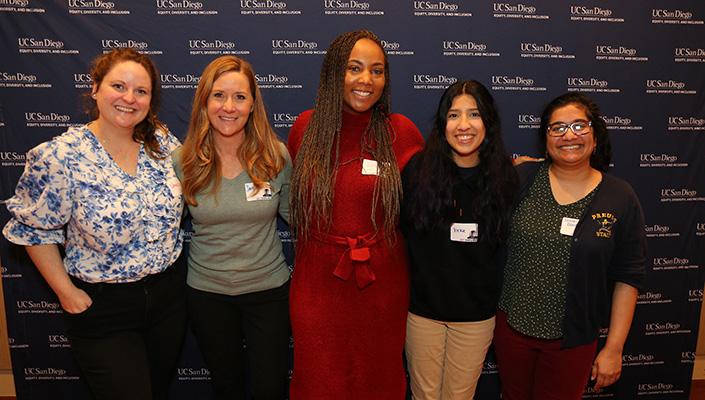
“I think people feel more comfortable setting boundaries and understanding when we’ve been asked to sacrifice too much of our well-being for work—but we’re still struggling to put that into practice,” Narvaez added.
With a focus on the eight dimensions of wellness—emotional, occupational, intellectual, environmental, financial, social, physical and spiritual—Narvaez asked participants to form groups at their tables and discuss how they’ve seen self-care and community care practiced, who they look to for support, and what the term “wellness” really means. She also emphasized the power of community and support systems to develop and fulfill many of these dimensions.
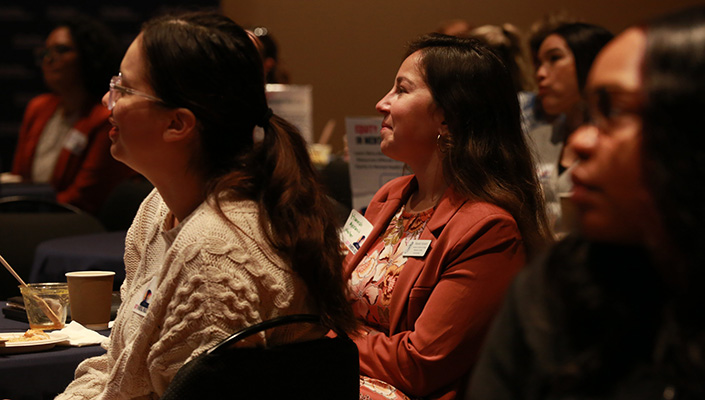
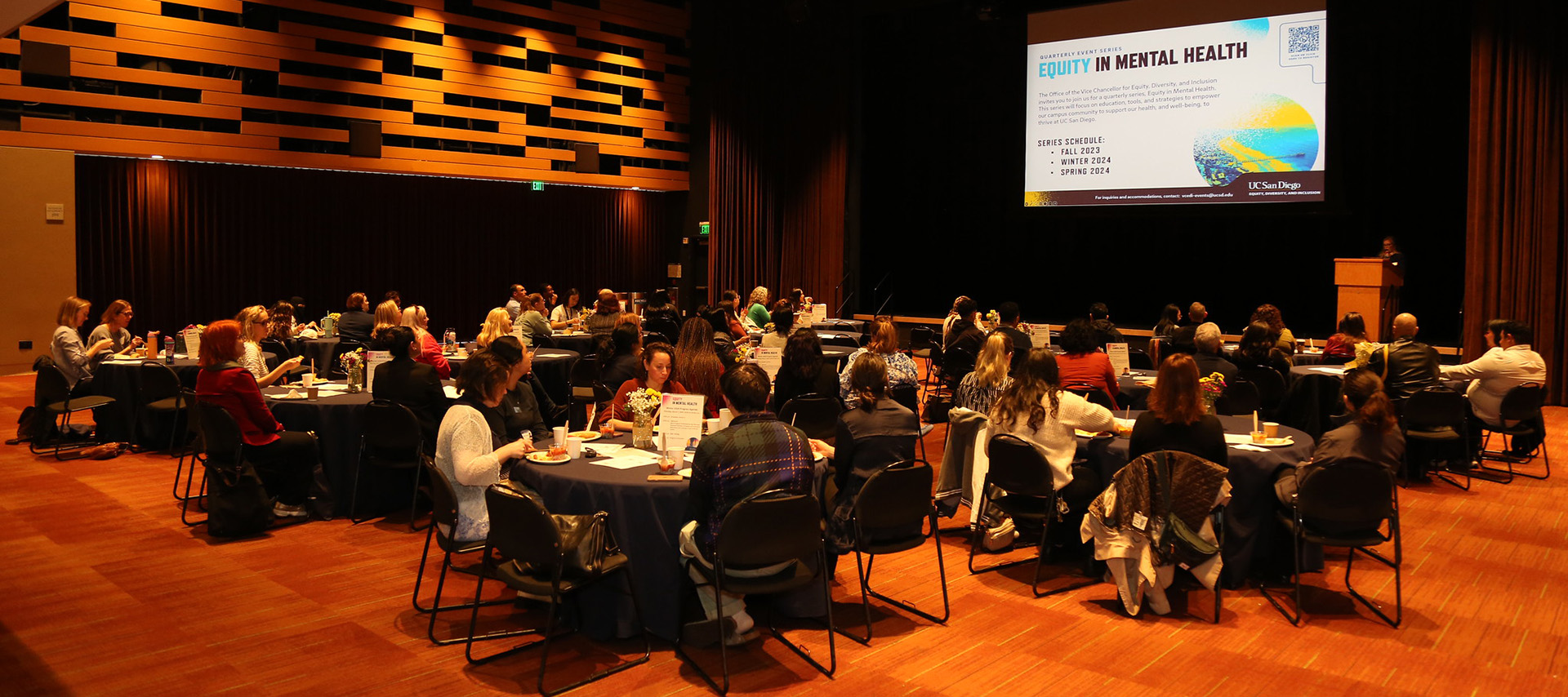
Throughout the discussion portions of the program, attendees thought critically and reflected amongst themselves about the barriers to wellness that exist on individual, institutional and structural levels—including the impact of white supremacy, capitalism, generational trauma and more.
“By focusing on our rest and well-being, we are taking care of our individual issues, but many of these are fueled by factors and structures in our society that our bodies are left to process the impact of—especially for queer, trans, Black and indigenous women and people of color,” Narvaez said.
Examining the concepts of wellness and rest through a social justice lens was a new exercise for many attendees, who worked together to brainstorm ways of reframing traditional notions of self-care—which, as Narvaez pointed out, has become a highly commercialized concept that conflates spending money with caring for ourselves.
Instead, Narvaez asked attendees to consider a collectivist approach to self-care and rest, sharing a quote from bell hooks, a globally renowned cultural critic, feminist and intellectual dissident: “One of the most vital ways we sustain ourselves is by building communities of resistance—places where we know we are not alone."
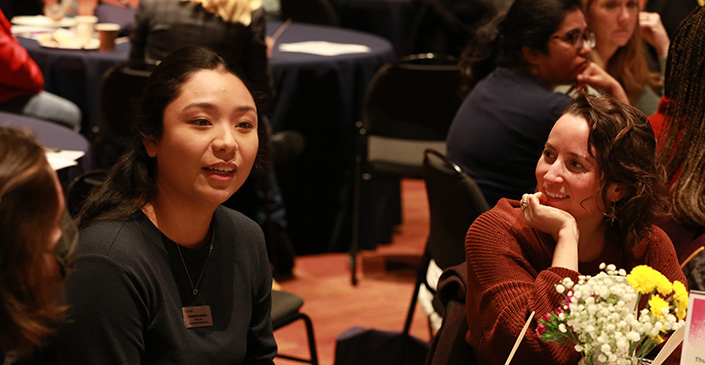
As she guided them through their journey of reframing their thinking around these concepts, Narvaez introduced the participants to “The Cycle of Liberation” by Bobbie Harro, which starts with moments referred to as “critical incidents” when individuals experience or learn something that makes them question what they have been taught or socialized to believe. The cycle goes through various stages as an individual works to end various forms of oppression, with self-esteem, balance, joy, support, security and spiritual base at the core of the cycle. “What would it mean to center those values?” Narvaez asked attendees.
Narvaez also introduced the concept of rest as resistance, based on the book “Rest is Resistance: A Manifesto” by Tricia Hersey, founder and creator of The Nap Ministry. She urged participants to think about how our society’s “grind culture” supports systems of oppression, and how they might band together within their communities to reexamine and redefine success and productivity—thereby prioritizing mental health and well-being.
Sharing an example from her own community at the Cross-Cultural Center, Narvaez described how their staff created “community care bios” in which each individual shares information about themselves, how they navigate the world, and what snacks or treats they like, so that they can support each other on hard days. She encouraged everyone in attendance to think about ways they might adopt similar practices in their own offices or departments.
“We all play a role in imagining and creating a space where we center the values of justice, joy, liberation, rest and resistance,” said Narvaez. “With everything going on right now in the world, a lot of times we can start getting a pretty pessimistic outlook on things or start feeling negative or hopeless about our situations. My goal in sharing the cycle of liberation and rest as resistance is that there are different ways of thinking about things that can lead to justice or creating a more just campus and a more just world. If we stop and accept things as they are, we’ll never see any progress.”
"We all play a role in imagining and creating a space where we center the values of justice, joy, liberation, rest and resistance."
You May Also Like
Stay in the Know
Keep up with all the latest from UC San Diego. Subscribe to the newsletter today.
